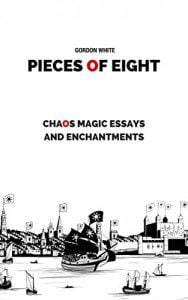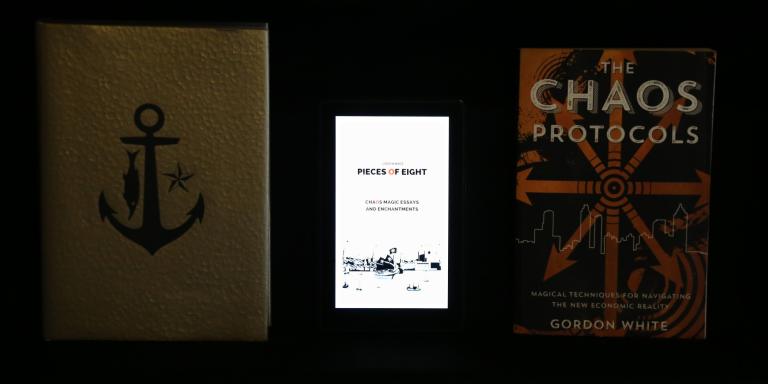by Gordon White
published by Amazon Digital Services, July 2016
Kindle only: $4.44
Another month, another book by Gordon White of Rune Soup. Or so it seems, anyway. This is the third book Gordon has published this year. Star.Ships: A Prehistory of the Spirits was published in February by Scarlet Imprint. The Chaos Protocols: Magical Techniques for Navigating the New Economic Reality was published in March by Llewellyn. And now at the end of July we have Pieces of Eight: Chaos Magic Essays and Enchantments, self-published by Gordon on Amazon as an e-book only. Why e-book only? Gordon explains on his blog.
Gordon White keeps the long-running Rune Soup blog, which I read religiously. He’s produced the Rune Soup podcast for the past 34 weeks, never missing a week. I hear him on other people’s podcasts once or twice a month. He recently started a subscription-based newsletter (but subscribing is free) called The All Red Line. And did I mention he just moved from London back to his native Australia?
Two years ago I stirred up a bit of controversy with my thoughts on the old saying “a poor magician is a poor magician.” My point was that a magician who doesn’t have their stuff together probably isn’t someone you want to be taking advice from, magical or otherwise.
By that standard, Gordon White is someone you should listen to very, very carefully.
Is Pieces of Eight really a chaos magic book? Gordon asks “what could possibly be served via the publication of another chaos magic book? Perhaps nothing.” It is certainly not a book that tells you how to do chaos magic – there are already plenty of those already available. Its stated purpose is “to dropkick the discourse into the twenty first century.”
In all three of his books, Gordon has said his purpose is to provide context for magical study and practice. Whether your path is magical, esoteric, or religious, context provides grounding. It helps you understand not just what you’re doing but why you’re doing it, who did it before you, and what it means. That’s particularly important with magic, which our mainstream world insists is fantasy and nothing more.
Every wizard needs to build rather than rent a metaphysics. And such a metaphysics needs to not only improve the success of your practical enchantments but also allow you to interrogate reality in an increasingly sophisticated way.
At the last Between the Worlds conference in 2015, organizer Ivo Dominguez Jr. stopped me for a brief hallway conversation and said my Four Centers of Paganism needs a fifth center: the search for the way the universe works. I’ve never written about that because it struck me as a rejection of science, even though I knew Ivo didn’t mean it that way. After this year’s tidal wave of Rune Soup magic, I’m finally starting to see the wisdom in Ivo’s statement. If the universe doesn’t run strictly on Newtonian physics, and if quantum mechanics and string theory are less certain and far less provable than advertised, then how does the universe work? I’ve long said there are many things about the nature of the universe that are beyond our capacity to know and I stand by that statement, but perhaps I’ve been a little too quick to abandon the search.
Materialism, it must be understood, is a premise of science, not a finding.
Another element of context is history. I’m not an occultist – I haven’t read all of the classic texts Gordon recommends. But I’ve read some of them, and I’ve read many in my own traditions, especially in Druidry with its emphasis on bardic work.
Learn and tell your history or lesser people will tell it for you. This is your lore. Keep it.
Most of the magic in Pieces of Eight involves working with spirits.
I would suggest that ongoing interaction with the spirit world is a naturally occurring, entirely normal, component of human existence. If that is indeed the case, then the need to elevate Animism to the Big Worldview Table is only increased. [In the “for what it’s worth” department, Tuesday’s post on animism was entirely written before I started reading Pieces of Eight.]
I’ve never been particularly fond of spirit work, or at least, not fond of working with certain kinds of spirits. I do regular work with Gods, ancestors, and nature spirits. When it comes to the kind of spirit work taught in the grimoire tradition, I’ve probably still got some residual fear of demons left over from my Christian upbringing. But…
What magic has to offer for the interested – if slightly foolhardy – seeker, is a set of protocols honed from centuries of spirit contact.
There’s a whole tradition here that’s at least two thousand years old and is probably as old as humanity, in one form or another. Because it’s Western, and because we stand in a line whose religion has been Christianity for a thousand years or more, many of the invocations and incantations are explicitly Christian. Gordon basically says not to worry about it, that we’re part of this tradition, that “real” Christianity is simply a revision of late Greek and Roman paganism, and that Protestantism (especially the low church, Evangelical variety) is to blame for our hang-ups with it. There’s some truth to that – truth that to this day is denied in conservative Protestant churches.
 Perhaps if I had grown up in a non-religious family, or if I had grown up in a high church Anglican environment, I might be able to work with Gordon’s suggestion. It would certainly make learning this sort of magic easier – there’s so much more documentation of it than from the Northwest European traditions that call to me. But I didn’t grow up in that environment. I grew up in fundamentalist Christianity and I’m not interested in opening that door again, even slightly. I’m a Druid and a polytheist – I’ll gladly and thankfully learn what I can from the grimoire magicians, but their path is not my path.
Perhaps if I had grown up in a non-religious family, or if I had grown up in a high church Anglican environment, I might be able to work with Gordon’s suggestion. It would certainly make learning this sort of magic easier – there’s so much more documentation of it than from the Northwest European traditions that call to me. But I didn’t grow up in that environment. I grew up in fundamentalist Christianity and I’m not interested in opening that door again, even slightly. I’m a Druid and a polytheist – I’ll gladly and thankfully learn what I can from the grimoire magicians, but their path is not my path.
As soon as I heard the title Pieces of Eight, I knew there would a be a pirate theme to the book, though perhaps it would be more appropriate to call it a subtext. In the Introduction, Gordon says
Chaos magic is always the pirates to the Victorian orders’ Royal Navy. And like the pirates of the Golden Age, its existence improves both itself and those it preys upon.
I’m in strong agreement with this.
This is what we do. We map these dangerous roads not to defeat or change Power – the new boss is ever the same as the old one and it is politically and historically naïve to think otherwise – but to build better lives outside the grasp and beyond the site of monoculture.
For all my deep exploration and practice of polytheism, animism, and magic, I’m still very much a Unitarian Universalist who wants to build a better world here and now. At the same time, I’m enough of a realist to understand that better world isn’t going to be fully manifest any time soon. So Plan B is to gather a community of like minded folks who want to study, practice, and work to make our own lives better, so we will have the skills and inspiration to do what we can to create a better future.
Practical enchantment is not a path to spiritual development. But living in a universe where practical enchantment works does make that quest just a little bit easier.
That’s why I study magic, even though my first calling is as a Druid and a priest. And sometimes, there’s a little overlap. Or more than a little.
The Sybils were, in Gordon’s words “superstar prophetesses and goddesses.” There is documentation of them as far back as 500 BCE and they were considered ancient even then. Their tradition continued well into the Christian era. Gordon says “the Sibyls are back.” When I read the descriptions of their proclamations, they sound an awful lot like the kind of ritual possession Diana Paxson has written about and I have experienced.
Now, imagine what someone with some natural talent for ecstatic communion and communication with the Gods and spirits could do if that was their job – if the community supported them physically and financially and regularly sought their guidance.
That’s context we don’t have. Yet.
I enjoyed Pieces of Eight. I downloaded it the same day it was released and I read it in a little over three hours (which leads me to believe that if it was a physical book, it would be 120 pages or so, depending on font and page size). It cleared up some things in my mind, and tied together a lot of loose ends from the Rune Soup blog and from Gordon’s first two books. He says that if you read all three, you’ll be able to read his fourth book, which cannot be written.
I feel like I’ve read Gordon’s fourth book, but I can’t implement its teachings. Or perhaps, I’m implementing them in ways he did not intend – which likely are ways he wouldn’t approve of. But while I do not consider myself a chaos magician, I’m following in fine chaos magic tradition: “trialling a lot of things and retaining those that work.”
So far it’s working.
So, who should read this book? Gordon says “it should not be the first book you read on magic but anything between second and final is fine.” Perhaps this is true for those who come to magic from an occultist perspective, but for those who come through the more usual paths of Wicca, folk magic, or pop culture magic, more reading and mainly a lot of practice is required. This is a “300 level” book, in large part because its minimalist approach requires a lot of familiarity with basic magical concepts and techniques.
Then again, if you read this book and every time you come across something you don’t understand, you go looking for books and practices and teachers who can teach them to you, you’ll end up with a first class magical education.
The bottom line: if you have an interest in this sort of magic, you’ll want to read Pieces of Eight.




















